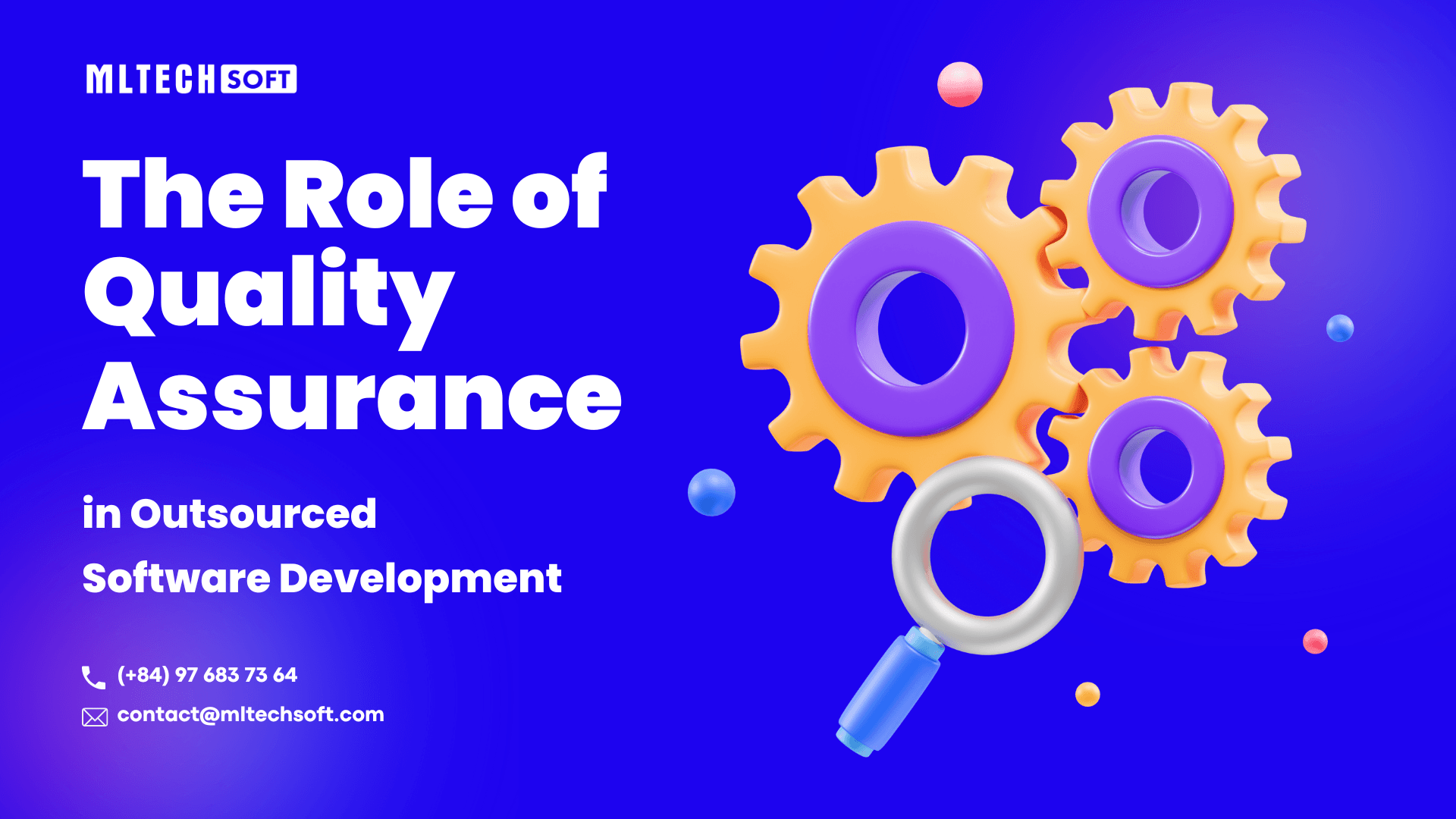Scroll down for more
The Role of Quality Assurance in Software Outsourcing

Ensuring top-notch quality in outsourced projects is more than just a checkbox; it's the secret sauce that transforms a good product into a remarkable one. Imagine outsourcing the development of your flagship software, only to find it riddled with bugs and glitches upon release. Not a pleasant scenario, right?
That's why prioritizing quality assurance from the get-go is paramount. After all, nobody wants to serve their users a half-baked cake, especially in the competitive landscape of software development.
1. What is Quality Assurance?
Quality Assurance in software development is like having a vigilant guardian angel watch over your project, ensuring that every line of code, every feature, and every user interaction meets the highest standards of excellence.
At its core, QA is the systematic process of ensuring that the software being developed meets specified requirements and quality benchmarks. It's not just about finding and fixing bugs, it's about proactively preventing them from ever seeing the light of day.
In the grand scheme of software development projects, QA serves several key objectives:
- Enhancing User Experience: QA endeavors to craft a seamless user experience, where every interaction is intuitive and devoid of obstacles.
- Preserving Brand Integrity: Effective QA safeguards the reputation and credibility of your brand. A single critical flaw can erode the trust painstakingly cultivated with customers.
- Optimizing Resource Allocation: QA acts as a safeguard against potential financial losses by identifying and rectifying issues early in the development cycle, thereby conserving valuable time and resources.
2. The Crucial Role of QA in Outsourcing
Quality Assurance (QA) plays a pivotal role in the success of outsourced software development projects, assuring several crucial areas:
2.1. Ensure Adherence to Project Requirements
QA acts as a vigilant guardian, ensuring that the final product aligns precisely with the specified project requirements. By meticulously overseeing the development process, QA minimizes the risk of misunderstandings or deviations from the intended scope. This attention to detail ensures that the result meets stakeholders' expectations and fulfills the project's objectives.
2.2. Mitigating Risks Associated with Outsourcing:
Outsourcing introduces unique challenges such as communication barriers, cultural differences, and geographic distances. QA serves as a proactive defense mechanism against these risks by establishing clear communication channels, fostering collaboration, and standardizing workflows. By identifying potential risks early on and implementing mitigation strategies, QA minimizes disruptions and ensures smooth project execution.
2.3. Maintaining Product Quality and Reliability:
QA is all about making sure the software is top-notch. Through comprehensive testing and validation processes, QA verifies that the software meets stringent quality standards. This rigorous approach not only enhances the user experience but also safeguards the reputation of the product and the organization. By prioritizing quality assurance, organizations can instill confidence in their software's performance and reliability.
2.4. Minimizing Post-Release Defects and Issues:
Post-release defects can undermine user satisfaction and erode trust in the product. QA plays a crucial role in mitigating these risks by conducting thorough testing throughout the development lifecycle. By identifying and addressing issues early on, QA minimizes the likelihood of post-release defects and ensures a smoother user experience. This proactive approach reduces the need for costly post-release fixes and maintains customer satisfaction.
In summary, QA serves as the linchpin of success in outsourced software development projects by meticulously addressing various critical areas, including requirements analysis, communication, testing, and risk mitigation. By embracing a robust QA process, organizations can navigate the complexities of outsourcing with confidence, secure in the knowledge that their software endeavors are fortified by a steadfast commitment to excellence.
3. Strategies for Effective QA in Outsourcing
In outsourcing software development, implementing effective Quality Assurance strategies is essential for project success. Here are some key strategies:
3.1. Establishing Clear Communication Channels
Clear and open communication is the cornerstone of successful outsourcing partnerships. Establishing robust communication channels early on ensures that all stakeholders are on the same page regarding project objectives, requirements, and expectations. Regular meetings, video conferences, and project management tools can facilitate seamless communication between the client and the outsourced team, fostering transparency and collaboration.
3.2. Implementing Comprehensive Testing Processes
Rigorous testing is crucial for ensuring the quality and reliability of outsourced software products. Implementing comprehensive testing processes, including functional testing, regression testing, performance testing, and usability testing, helps identify and address defects and issues throughout the development lifecycle. By incorporating testing into every stage of the project, from requirements gathering to deployment, potential problems can be detected and resolved early, minimizing the risk of post-release issues.
3.3. Utilizing Automated Testing Tools
Automated testing tools streamline the testing process, allowing for faster and more efficient testing of software applications. By automating repetitive test cases and scenarios, these tools help increase test coverage, reduce human error, and accelerate the testing cycle. Additionally, automated testing tools can be integrated with continuous integration and continuous deployment (CI/CD) pipelines, enabling rapid and frequent releases while maintaining high-quality standards.
3.4. Regular Performance Monitoring and Reporting
Continuous performance monitoring and reporting provide valuable insights into the health and stability of outsourced software projects. By monitoring KPIs such as code quality, test coverage, defect density, and response times, project teams can proactively identify areas for improvement and take corrective actions as needed. Regular reporting to stakeholders keeps them informed about project progress, challenges, and successes, fostering transparency and accountability.
By implementing these strategies, organizations can ensure effective Quality Assurance in outsourced software development projects, leading to high-quality deliverables, satisfied stakeholders, and successful project outcomes.
4. Case Study: QA Transformation at Google
4.1. Project:
Google, a multinational technology company, embarked on a large-scale QA transformation initiative to enhance the quality and reliability of its products and services. As part of this initiative, Google outsourced the implementation of a comprehensive QA framework to a leading software consulting firm, QualityTech Solutions.
4.2. Challenge:
Google faced challenges in ensuring consistent quality across its diverse portfolio of products and services. The rapid pace of development and deployment, coupled with the complexity of Google's technology ecosystem, posed significant challenges for QA.
4.3. Solution:
QualityTech Solutions collaborated closely with Google's internal QA teams to design and implement a customized QA framework tailored to Google's unique requirements and objectives. The framework encompassed a wide range of QA activities, including test automation, performance testing, security testing, and user experience testing.
4.4. Outcome:
The implementation of the QA framework led to a significant improvement in the quality and reliability of Google's products and services. Bugs and defects were identified and resolved earlier in the development lifecycle, leading to fewer post-release issues and higher customer satisfaction. The collaboration between Google and QualityTech Solutions resulted in a more efficient and effective QA process, enabling Google to deliver innovative and high-quality products to its users worldwide.
This case study illustrates how Google leveraged outsourcing to drive a successful QA transformation initiative, resulting in tangible improvements in product quality and customer satisfaction. By partnering with an experienced software consulting firm, Google was able to overcome the challenges associated with QA and achieve its business objectives effectively.
Conclusion
In conclusion, the importance of Quality Assurance (QA) in outsourced software development cannot be overstated. Throughout this discussion, we've explored how QA serves as the linchpin of success, ensuring that outsourced projects meet requirements, mitigate risks, maintain quality, and minimize post-release issues.
QA is not just a process but a commitment to excellence and continuous improvement that underpins the success of outsourced software development projects and strengthens partnerships between organizations and outsourcing vendors. By embracing QA as a strategic imperative, organizations can navigate the complexities of outsourcing with confidence, secure in the knowledge that their projects are fortified by robust quality assurance practices.
Get our blog
Want the latest and greatest from our blog straight to your inbox? Chunk us your details and get a sweet weekly email.
Read more in our blog

Project Management
The Impact of Dynamic Pricing on Customer BehaviorExplore the impact of dynamic pricing on customer behavior and learn how to implement effective pricing strategies.

Project Management
Focus in Scrum: Keeping Your Team on TrackDiscover effective strategies to maintain focus within your Scrum team, overcome common challenges, and boost productivity.

Project Management
Key Metrics for Mobile App SuccessDiscover the essential metrics for mobile app success, from user acquisition and engagement to monetization and performance.
MLTECH SOFT